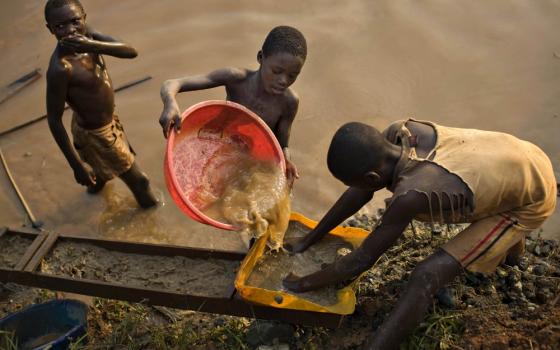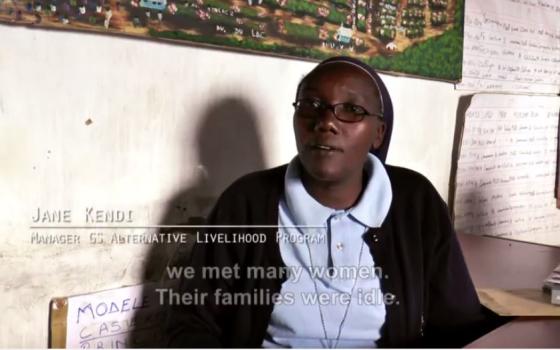I have done justice training with the project staff in Kolwezi, Democratic Republic of the Congo since 2013, so I was anticipating the release of the video "Maisha: A New Life Outside the Mines." I was told it was a documentary of the work of the Good Shepherd ministry being done there. And so it is — and quite a good documentary at that.
But for me, and I think for many people seeking practical transformative pathways in our world, it is much more. I think of it as a parable. Like the Gospel parables of Jesus, the 28-minute video employs a story with everyday settings and characters to challenge our thinking about taken-for-granted realities and the values of dominant culture. It presents contrasts and challenges that involve life lessons and instructive principles.
This parable is grounded in the experiences of subsistence miners who are referred to as “artisanal” miners who, as the narration tells us, extract the metals that “power the global economy.” Immediately into the story we hear from a representative of the Ministry of Artisanal and Small Scale Mining who explains, on behalf of the prevailing culture, that “the authorities determined that they [the people] have a right to extract the [leftover] minerals to make a living.” But when the people have their say and speak of rights, they refer to the right to education, the right to food, freedom from violence. The contrasts are apparent.
To understand the situation, the video briefly reviews the history of colonialism and subsequent independence which readied the Democratic Republic of Congo to fit so neatly now into the globalized scenario. Multinational corporations and the race for high measures of Gross Domestic Product (GDP) are normative structures which, when functioning as leading necessities, result in “lining the pockets of a few at the expense of many.” I thought about the story of Lazarus and Dives told to us by Jesus (Lk 16:19-31).
I thought about the great chasm between the prosperous and the beggars. But Jesus’ story takes place after the death of the characters. In our African parable today, with just as great a chasm, the characters live, and the chasm is crossed.
The force that navigates the gap is, strangely, a vision. It is a vision of new life guided by a small group of religious sisters (Sisters of the Good Shepherd), who engage the community of Kolwezi in clarifying, enlarging and implementing their dreams. From herein the narrative grows hopeful with energy.
Administrators, staff personnel and program participants look to a life outside the mines. They speak of a life in which they can feed their children and where violence towards women has ceased. They shine a light on specific alternatives that deny the inevitability of status quo power and that restore communal bonds and create new identities that nurture children’s dreams of education.
This new reality — this vision, this energy — breaks the cycle of a state's using its people and children for cheap labor and replaces it with community contributions and dignified labor. This force has created, among other programs described, a cooperative farm (Maisha) that prioritizes sustainable food and livelihoods for families, without worry about GDP! The viewer will see the dynamism of how the vision takes hold and takes shape.
Consider, this is a parable. If you dare to watch it, you are bound, as in hearing the Gospel lessons of Jesus, to enter the story. It is not for edification nor entertainment. It is about nothing less than the salvation, the transformation, of our world in our time in every place where humanity is crushed.
The viewer, then, is a central character of this story. After viewing the mind may be beset by thoughts like: Which characters do I resemble? With whom do I identify? On which side of the chasm are my feet planted? And, how, with others, do I move toward alternate structures and new pathways toward a life outside the mines.
To learn more about the video, use this link: fondazionebuonpastore.org/progetti/maisha-film
[Sr. Clare Nolan is the International Justice Training Coordinator for the Sisters of the Good Shepherd, an international woman’s religious congregation that is involved in providing social services in about 70 counties, with a particular focus on women and girls in vulnerable situations.]
Previous articles on Global Sisters Report by Clare Nolan about the Good Shepherd Sisters' work in Kolwezi:
Religious congregations and mission partners: An experience of mission effectiveness in Kolwezi
Selma then – the world now: A visit to the Edmund Pettus Bridge and justice today
Walking towards life – A return to Kolwezi, Democratic Republic of Congo
Entering a new reality: Kolwezi, the Democratic Republic of Congo


